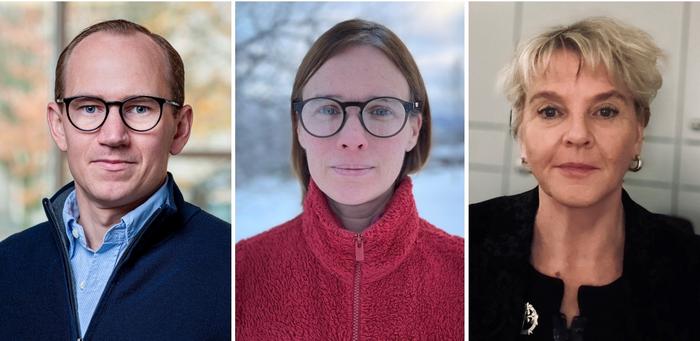“An absurd decision”, “a scandal”, and “I meant nothing”. These are some harsh words when describing the ban on partners in postnatal wards during the pandemic, from a partner perspective. A study from the University of Gothenburg reveals a picture of how the exclusion was perceived.

Credit: Photo by Emelie Asplund, Robert Ljung and Sofie Elden.
“An absurd decision”, “a scandal”, and “I meant nothing”. These are some harsh words when describing the ban on partners in postnatal wards during the pandemic, from a partner perspective. A study from the University of Gothenburg reveals a picture of how the exclusion was perceived.
In many parts of the country, the COVID-19 pandemic meant that partners of new mothers were not allowed in the postnatal clinic. The restrictions created anxiety and dissatisfaction with the care, especially among partners of first-time mothers. This is according to the current study, published in the journal Birth.
The study was conducted by an interdisciplinary team of researchers from political science, obstetrics and gynecology, and also nursing science and health. The study compares the views of partners of women, who gave birth before the pandemic and during the pandemic, on care during labor and postnatally.
The study is based on survey responses from 727 pregnant women and their partners. The data comes from the PregDem research project at the University of Gothenburg and from the Pregnancy Registry.
“The study shows a 30% drop in satisfaction with postnatal care when partners were no longer allowed in the postnatal ward. Partners of first-time mothers were the most affected, with a 43% drop in satisfaction in this group. The same decline could not be observed for the labor ward where partners were still allowed to participate,” says Petrus Olander, a political scientist and one of two first authors.
Lost days with the baby
The understanding of the risk of infection during the pandemic is also expressed by partners, but what is described is a feeling of exclusion from partnership and parenthood. “Before, I had heard that my role as a father is important, but suddenly I did not matter,” says one person in the study.
Another respondent described the decision to exclude partners as absurd: “If I as a partner spend three days in the labor ward with the mother, there is no reason for me not to go to the postnatal ward, where there is less contact with staff.”
Several responses also reflect anger and disappointment: “It is a scandal that a father is not allowed in the postnatal ward when his wife has had a cesarean section! Now the father is deprived of the first two days with his child! Not ok! Two days you never get back!”
“The experience of losing time with the child recurs in several survey responses,” says Lisa Berglin, resident physician and PhD student in obstetrics and gynecology, and also first author:
“The fact that the partners of first-time mothers found it particularly difficult not to accompany them to the postnatal ward after the birth is due to most of them also becoming parents for the first time, and their first days with the baby were lost. At the same time, they were concerned that the busy staff at the postnatal ward would not be able to compensate for the absence of fathers in the postnatal ward, and that this could lead to shortcomings in the care of the new family,” she says.
Follow-up in progress
There is nothing in the results to link medical complications with satisfaction levels. Those with higher incomes were slightly less satisfied, but social background was not otherwise linked to satisfaction or dissatisfaction levels.
The researchers emphasize the importance of measuring satisfaction as an indicator of whether Swedish postnatal care succeeds in its mission to facilitate parenthood for new parents. Further research will follow up those who were affected by the partner ban in postnatal wards, especially first-time parents.
The last author of the study is Helen Elden, a midwife and professor of reproductive and perinatal health:
“The study shows the need to take partners into account in any future restrictions, and to plan for compensatory measures, if necessary,” she says.
Journal
Birth
DOI
10.1111/birt.12816
Method of Research
Survey
Subject of Research
People
Article Title
The impact of exclusion due to COVID-19 restrictions on partners’ satisfaction with Swedish hospital postnatal ward care: A multi-methods approach
Article Publication Date
30-Jan-2024
COI Statement
Contacts:
Petrus Olander, tel. +46 736 69 38 21, e-mail [email protected]
Lisa Berglin, tel. +46 31 343 41 89, e-mail [email protected]
Helen Elden, tel. +46 702 88 78 82, e-mail [email protected]
Images: Petrus Olander, Lisa Berglin and Helen Elden (photo: Emelie Asplund, Robert Ljung and Sofie Elden)




